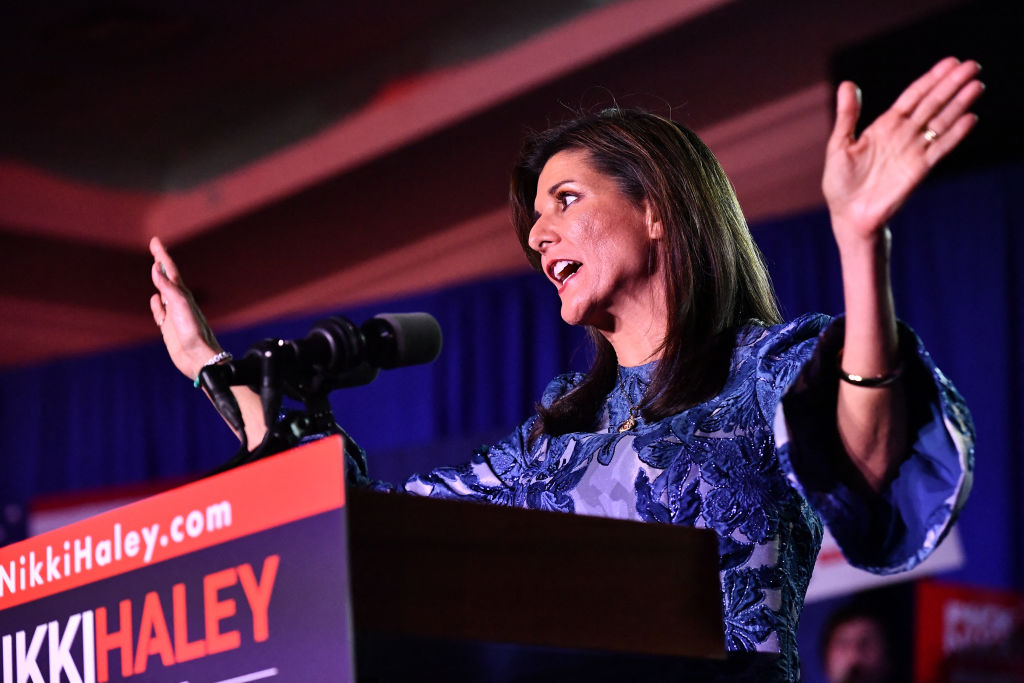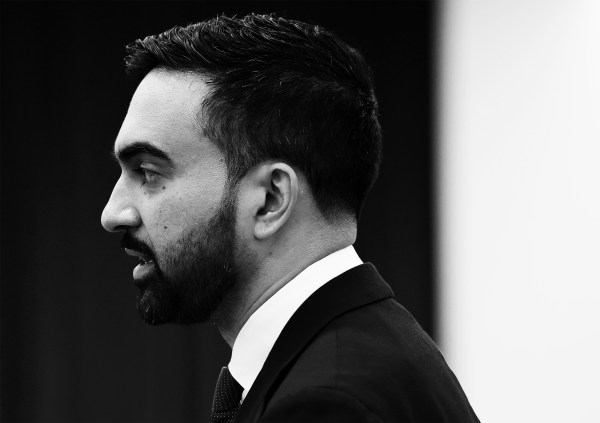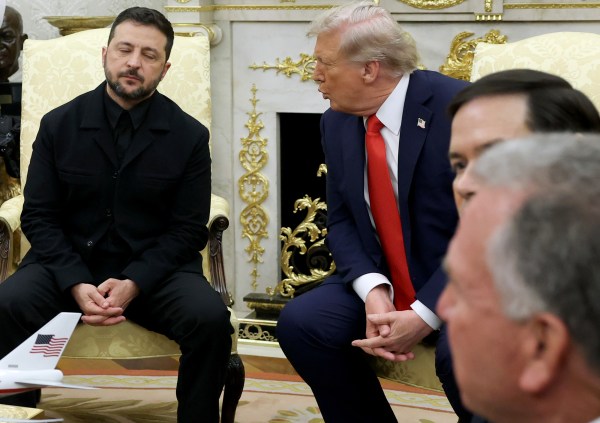Happy Wednesday! We may have all been paying attention to the wrong DeSantis—Ron’s son Mason may have a bright future as an NFL analyst.
Up to Speed
- Donald Trump racked up his second win of the GOP primary in New Hampshire Tuesday, defeating rival Nikki Haley 54 percent to 43 percent. Taking the stage at his victory party flanked by old primary opponents Doug Burgum, Vivek Ramaswamy, and Tim Scott, Trump grumbled that Haley was “still hanging around” after a “very bad night,” while Haley pledged to stay in the race. “New Hampshire is first in the nation. It is not last in the nation,” she said. But the institutional Republican pressure on Haley to bow out continues to grow. “I do think there is a message that’s coming out from the voters which is very clear,” Republican National Committee Chair Ronna McDaniel said on Fox News Tuesday night. “We need to unite around our eventual nominee, which is gonna be Donald Trump, and we need to make sure we beat Joe Biden.”
- Meanwhile, President Joe Biden sailed to victory in New Hampshire’s unsanctioned Democratic primary—despite his name not appearing on the ballot. Changes to the Democratic primary schedule last year caused a falling out between the Democratic National Committee and New Hampshire’s Democratic Party: The DNC wanted to move South Carolina to the beginning of the nominating process, but New Hampshire Democrats insisted state law obligated them to go first. The result: A purely formal contest that awarded no delegates and in which Biden did not participate. Challengers like Rep. Dean Phillips and Marianne Williamson hoped New Hampshire acrimony over the situation might give them an opening for a momentum-building win there, but no such luck: Biden allies orchestrated a write-in campaign that was enough to carry the day. With 90 percent of ballots tallied, Biden had 52 percent of the vote, Phillips had 20 percent, and Williamson had 5 percent.
Retail Politics Not Dead in New Hampshire

CONCORD, New Hampshire—At the end of it all, Donald Trump once again won the Granite State’s vaunted “first in the nation” primary by repeating his rather counterintuitive strategy: no retail politicking, all big-top rallies. The former president’s star power, quasi-incumbency, and sense of inevitability propelled him to an 11-point victory over remaining rival Nikki Haley.
But as Haley acknowledged in her concession speech Tuesday evening, her 43 percent share of the vote in losing to Trump demonstrated that traditional campaigning, and what it can do for an underdog contender in New Hampshire, aren’t passé. In fact, the town hall meetings, lunchtime diner drop-ins, and handshakes and photolines still produce results in a state whose voters continue to reward candidates who show up and engage in the process.
“It has been almost a year that we’ve been campaigning in New Hampshire, touching every hand, answering every question, being the last person to leave,” Haley told supporters gathered at her Election Night party. While that wasn’t quite true—by the end of her run here, she was forgoing the typical open-question forums that have elevated previous longshot candidates such as John McCain—Haley nonetheless spent months in New Hampshire talking directly to voters in venues big and small.
That was especially the case in the final five days of the New Hampshire campaign, during which Republican Gov. Chris Sununu, her top backer here, criss-crossed the state with the former South Carolina governor and ex-U.S. ambassador to the United Nations as she appealed for votes. Haley, Sununu said in a post on X (formerly Twitter), “turned the narrative of the national media on its head and proved this is indeed a two person race. And tonight, Granite State voters put wind in her sails as she heads off to her sweet home state of South Carolina.”
The final RealClearPolitics average of New Hampshire polls predicted a nearly 20-point blowout: Trump 56.8 percent of the vote; Haley 36.5 percent. The former president still defeated Haley easily, winning 54.5 percent to 43.4 percent at press time with votes still trickling in. But her late close and closer-than-expected finish had Granite State political gurus gushing that the “first in the nation” process still works for underdog White House hopefuls.
“New Hampshire did for Nikki Haley what it has done for countless other candidates—leveled the playing field and made her a contender against a powerful opponent. She started at 2 percent but embraced New Hampshire early, cherished our political traditions and engaged in a meaningful way that began building her profile long before her strong debate performances,” Jim Merrill, a veteran Republican operative in New Hampshire who has guided multiple presidential primary bids in his state (but was neutral this time around) told The Dispatch Wednesday morning.
“Her loss to Trump here doesn’t diminish the fact that the oxygen and opportunity the New Hampshire primary provided,” Merrill added.
But it wasn’t just the New Hampshire way that came through for Haley. Sununu was instrumental in her overperformance at the polls.
The 49-year-old New Hampshire Republican scion was by Haley’s side at nearly every campaign stop since he endorsed her last month, quietly guiding her strategy for pitching voters—and where in the state to go, and go back to, to make that pitch. Haley thanked him profusely during her speech Tuesday evening, ending her remarks by thanking a litany of political figures who boosted her, in recognition of the way connections in this small state can still matter—from Sununu’s father, former Gov. John H. Sununu, to former U.S. Sens. John E. Sununu and Judd Gregg, to state senators and mayors.
Meanwhile, while Haley was making the most of her expectations-defying finish up in Concord, the state capital, Trump was celebrating his third consecutive win in the New Hampshire primary with a raucous victory party down south in a hotel ballroom in Nashua, a stone’s throw from the Massachusetts border. The former president basked in his triumph, and so did the hundreds of supporters who showed up to cheer him on.
New Hampshire, Trump told them, “is a very special place.”
The former president might not have campaigned the “New Hampshire way” per se.
But it’s important to note that in addition to his big-tent political rallies, his professional 2024 campaign hosted multiple, more traditional campaign events featuring top surrogates. These were intimate gatherings at a local diner, bar and grill or Trump campaign headquarters where the prominent Republican headliner backing Trump urged supporters and volunteers to knock on doors, make phone calls, and otherwise get out the vote for the former president.
Does Nikki Haley Still Have a Path?
CHARLESTON, South Carolina—Nikki Haley’s camp is dismissing the notion that a double-digit loss in New Hampshire Tuesday compels her to drop out of the GOP race.
“It’s wrong for [the media] to try to pick who stays and who doesn’t stay in,” GOP Rep. Ralph Norman of South Carolina told The Dispatch before the polls closed. “Let’s let the American people decide, and we will abide by whatever they say.”
After media outlets called New Hampshire for Donald Trump Tuesday night, Haley vowed to take the fight to her home state, where the GOP primary will be held exactly one month from today. “South Carolina voters don’t want a coronation. They want an election, and we’re gonna give them one,” she said in her concession speech. Earlier in the day, Haley campaign manager Betsy Ankney released a memo noting that South Carolina “has no party registration, and anyone can vote in the Republican primary if they have not already voted in the Democrat primary [on February 3].” A month is a long time in politics, the memo noted. Then after South Carolina comes an open primary in Michigan, and 11 of 16 Super Tuesday states on March 5 have “have open or semi-open primaries.”
But a big problem for Haley is that the South Carolina electorate will almost certainly be more challenging than the electorate in New Hampshire. Haley cleaned up among moderate New Hampshire voters, who made up 28 percent of the Republican primary electorate Tuesday, as well as liberal voters who made up 6 percent. Haley won 74 percent of those two blocs—which together accounted for more than one-third of all New Hampshire GOP voters Tuesday. But South Carolina will almost certainly have a much smaller share of moderates: In 2016 moderates and liberals made up 18 percent of the South Carolina GOP primary electorate.
In other words, Haley needs to dramatically improve among self-identified conservative voters to have any chance in South Carolina. Seventy-one percent of conservatives backed Trump in New Hampshire, but Haley suggested her message would resonate among South Carolina conservatives because they know her. “When we get to South Carolina, Donald Trump’s gonna have a harder time falsely attacking me,” she said. “The great people of South Carolina know I cut their taxes. They know I signed the toughest illegal immigration bill in the country. They know we passed voter ID.”
Of course, it would be naive to think that a monthlong one-on-one race against Donald Trump in South Carolina would mainly involve disputes over policy rather than ad hominem attacks. “I don’t get too angry, I get even,” Trump said about Haley during his New Hampshire victory speech.
Could Haley squander any shot at being Trump’s running mate by staying in the race? “She does not want VP, she’s not running for VP, nor do I think she would take it,” Norman, a Haley surrogate, told The Dispatch Tuesday. He shrugged at concerns the fight might get vicious. “When it’s all said and done, politics is politics and words spoken are quickly gotten over. I’ve never taken it personal. And I don’t think Nikki does,” Norman said. “The way—the names he gives people is hilarious.”
Trump recently called Haley “Nimbra,” a mangling of her first name Nimrata. As Norman sees it, it’s all of a piece with Trump’s calling rivals “low-energy Jeb and little Marco and Pocahontas. That’s funny. And he can do that … because the way he delivers it.”
Norman, who gave Haley her lone endorsement among members of Congress, plans to speak at a Haley rally in North Charleston on Wednesday night and is happy to stick with Haley as long as it takes. “I don’t mind being out there alone,” he said. “I believe in her, and I’m loyal to her, and I will stick with her rain or shine until she either wins it or she decides it’s no longer feasible.”
Biden Shouted Down by Pro-Palestinian Protesters at Abortion Rally
MANASSAS, Virginia—President Joe Biden intended to spend Tuesday’s campaign rally—his first of the year alongside Vice President Kamala Harris—railing against Republican attacks on abortion access in America. And he did, when he could get a word in.
But the flow of Biden’s remarks here at a satellite campus of George Mason University were constantly interrupted by protesters in the crowd leaping to their feet one by one to shout about another issue: Biden’s support for Israel’s retaliatory attacks against Hamas in Gaza, which have killed thousands of Palestinians since the strikes began in October. The audience spent half its time trying to listen to Biden, the other half trying to drown out shouts of “free Palestine!” and “ceasefire now!” with increasingly brittle chants of “FOUR MORE YEARS!” as uniformed police scurried about removing the protesters.
“Because of Donald Trump, doctors are fleeing their home states, setting up practices in other states because they’re afraid they’ll be put in prison if they exercise their responsibility,” Biden said. “Donald Trump and MAGA Republicans,” he went on as another protester started in, “including the woman hollering …” He trailed off.
Fresh from major electoral wins on the issue in 2022 and 2023, Biden and the Democrats see abortion policy as crucial to their 2024 chances, a rare unifying topic that can both energize their base voters and pull in wide swaths of independents. After the 2022 end of Roe v. Wade made it possible for laws restricting abortion to slam back into place across the country, Democrats have relentlessly messaged the stories of women who have fallen through the cracks of the new legal regime. Women like Amanda Zurawski, who introduced Biden to the crowd on Tuesday after sharing her own story: When her water broke less than 18 weeks into her pregnancy, she was unable to get an abortion at a Texas hospital until after she went into life-threatening septic shock.
“What I went through was nothing short of barbaric,” Zurawski said from the stage. “And it didn’t need to happen. But it did, because of Donald Trump.”
It’s a testament to how politically potent the issue has become that Biden, a Catholic who for decades in the Senate tacked toward the center on abortion, is now making it part of his core pitch to voters, and to the young Democrats who polls show are most lukewarm on his reelection in particular.
One of those young voters is Ella Nelsen, president of the University Democrats at the University of Virginia. Nelsen told The Dispatch ahead of Biden’s speech she was glad to see him leaning in on abortion policy: “I think it speaks to young voters, which is something that I’m personally worried about—I think polling and just the energy I’m feeling around UVA grounds is worrying me a little bit for this year.”
But many other young people present weren’t there to hear Biden at all—they were there to shout him down. Tensions quickly ran high. As the umpteenth protester jumped to his feet near the end of Biden’s remarks to shout “Genocide Joe has got to go!” an older woman next to him leapt up too, fists clenched, face contorted. “Deadbeat!” she shouted at the protester, bobbing back and forth, plainly on the verge of trying to hit him as police marched him away.
It wasn’t that she approved of everything about Biden’s handling of the war in Gaza, the woman—an Alexandria physical therapist named Leslie Haemer—told The Dispatch after the speech. “I think he’s in a very difficult place,” she said, expounding at length and in granular detail about her complicated feelings on the conflict.
But “this is an abortion rally, supporting abortion—not just abortion, but the right to privacy for our women that has been taken away,” Haemer said. “And as far as the people who came as plants … It’s horrendous. I had two people sitting on either side of me that were screaming, and that made me very uncomfortable.”
“It’s infuriating—we came here, we waited in line, we had wristbands, we were, quote, ‘invited’ to this rally,” she went on. “To have it interrupted repeatedly by people that are ignorant of the fact, that don’t understand the history of the Middle East, period … they’re at the wrong rally.”
This remains the greatest electoral challenge facing Biden: To beat Trump, he’ll need both young progressives and older liberals showing up to pull the lever.
Outside the rally, another large group of pro-Palestinian protesters had assembled, waving flags and chanting slogans as they lined the street Biden’s motorcade was to drive down. Outside, too, were four or five protesters of another nature: local Catholic pro-lifers holding signs depicting aborted fetuses.
“We usually go down and protest the abortion clinic down in Falls Church,” said Ken Groves. “So we just came out here to protest this because he’s our, you know, the big pro-abortion president. He’s probably the worst one we ever had.”
Were they surprised to find themselves in the company of a bigger, louder protest from the opposite side?
“They aren’t really the opposite side,” Groves said. “We’re pro-life. They’re against Biden. We’re against Biden too.”
Notable and Quotable
Donald Trump: “Did you ever think—she actually appointed you, Tim. Think of it, appointed, and you are the senator of her state, and [you] endorsed me. You must really hate her.”
South Carolina Sen. Tim Scott: “I just love you.”
—exchange on stage during Trump’s New Hampshire victory speech, January 23, 2024








Please note that we at The Dispatch hold ourselves, our work, and our commenters to a higher standard than other places on the internet. We welcome comments that foster genuine debate or discussion—including comments critical of us or our work—but responses that include ad hominem attacks on fellow Dispatch members or are intended to stoke fear and anger may be moderated.
With your membership, you only have the ability to comment on The Morning Dispatch articles. Consider upgrading to join the conversation everywhere.